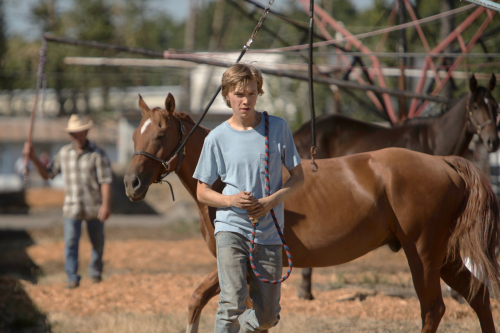
Scott Patrick Green/A24
MOVIE REVIEW
Lean on Pete (2018)
Novels are interior things which expose us to people’s thoughts first; from there we learn about how they move. Movies are exterior things; we watch first how people move and from there learn about how they think. Low-budget American movies tend to be about noise, covering a small budget through an enormous amount of dialogue. Low-budget British movies tend to be about silence, how people react to think and allow their thoughts to dance over their face. Andrew Haigh, a British director, has adapted Willy Vlautin’s American novel without a lot of money nor with much noise. Some parts of the adaptation work brilliantly. Others needed a little more thought.
The movie starts with skinny 15-year-old Charley (Charlie Plummer) unpacking small trophies in a rotten little house in Portland, Ore. His thoughtless dad, Ray (Travis Fimmel), has already taken up with a married woman (Amy Seimetz in a blink-and-you’ll-miss-her part) from his new work and disappears for days at a time. Charley likes to run, and as he explores the new neighborhood he discovers a broke-down racetrack. There he encounters a broke-down horse trainer, Del (Steve Buscemi) and a broke-down but still fast horse named Lean On Pete. Del offers Charley 20 bucks for two days’ work, which is a terrible offer but also money for food. So Charley takes it.
The initial tone of these scenes is slightly off, because Mr. Plummer never quite hits the right note of a kid whose main emotions are anxiety and hunger, and who has learned to lie smoothly and never ask for help despite that going against his nature. Mr. Buscemi is also too likable a guy to convince as a cutthroat animal abuser. Mr. Plummer bears an extraordinary resemblance to River Phoenix, especially in his “Running on Empty” days, which was a movie that only needed the birthday-cake scene to show what Phoenix was up against. One brief shot of Charley alone in a dirty kitchen, scowling at empty cans, doesn’t adequately establish just how much he’s had to fend for himself. Del is also not supposed to be a nice man, so it’s a shame that the most talking he does (in a direct lift from the book) is over a lunch where he asks Charley about his mother. It’s left to Chloë Sevigny, as a jockey who knows that riding dirty is the only chance she has, to play the Basil Exposition part. We’re supposed to feel terribly sorry for Charley as he shovels shit and listens to Del and Bonnie bicker. Instead we see a kid as part of a team. It’s a team made up of bad people who don’t like each other much, but at least they buy him food and fuss over him, which is more than anyone can say about his dad.
Then there is a plot twist, and then another one, and suddenly Charley and Pete are lost in the middle of a desert in the Pacific Northwest, trying to find an aunt that Charley hasn’t heard from a long time. The novel was published in 2010, when it was just about believable that a teenager wouldn’t have their own cellphone or use social media, but since the timeframe is never made clear the rest of the plot relies on that fake tension. (“American Honey,” in which a British director also told the story of a rootless working-class kid struggling in an unfriendly landscape, fell into the same trap. Last year’s “Certain Women” is also set in the working-class Northwest; but while its characters were struggling, they were all adults.) While they travel he unburdens his heart to the horse in a way that could wring tears from a stone. Charley sees himself in Pete, which the movie doesn’t overdo. And in a refreshing change from most road movies, he meets almost nothing but kindness along the way. When he knocks on the door of a farmhouse to beg water for Pete, he is taken in for a few days by two cheerful veteran bros, who know about horses and give him beer and ice cream. The police he encounters are kind; the waitress he steals from is sympathetic; he even convinces strangers to let him borrow their phones. Danger is still everywhere though not as you might expect it. There are two scenes of extraordinary violence, one shown and one not. But it most brutally arrives in the shape of a homeless, racist alcoholic played by Steve Zahn.
Mr. Haigh’s sanitizing of Charley and Pete’s ugly life is only to be expected in a major motion picture directed by someone born and raised in a country with safety nets. Mr. Vlautin’s novel (which is one of the best American books of the last 20 years) shows Charley’s high-wire act in a more thoughtful and believable way, which the movie doesn’t quite manage to preserve. But this movie has Mr. Plummer breaking into a pure, wide smile every time he sees Pete run. It has cinematographer Magnus Jønck’s perfect shot of Charley and Pete by a tree under a sky full of stars. And it has a kid no one much cares about discovering who he is by trying to save an animal no one much cares about either. In Charley’s America, love is the rarest thing there is. With this horse, this frightened and famished kid finally understands love as something he is capable of. And that’s something worth a lot of noise.
Comments